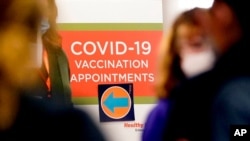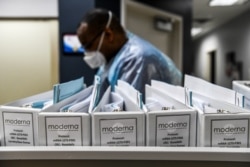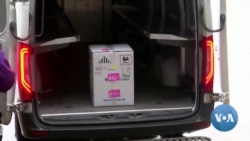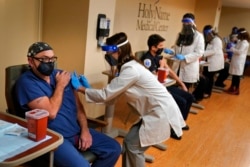A U.S. panel Thursday endorsed emergency use of a second COVID-19 vaccine.
A committee of independent expert advisers to the U.S. Food and Drug Administration voted, after seven hours of discussion, to recommend the use of a vaccine developed by U.S. drug manufacturer Moderna, one week after federal regulators authorized the first vaccine for emergency use.
“The evidence that has been studied in great detail on this vaccine highly outweighs any of the issues we’ve seen,” Dr. Hayley Gans, of Stanford University Medical Center, said Thursday.
FDA Commissioner Steven Hahn said late Thursday that the agency will quickly authorize the vaccine, perhaps as soon as Friday.
The news comes as the United States has recorded nearly 310,000 deaths from the virus, according to the Johns Hopkins Coronavirus Resource Center. There are more than 17 million confirmed cases of COVID-19, the disease caused by the coronavirus, in the U.S.
Once approved, Moderna would then begin shipping nearly 6 million doses, with the first planned for health workers and nursing home residents.
Last week, after the advisers endorsed the use of the first vaccine, the FDA authorized it for emergency use a day later.
That vaccine, developed by U.S. drugmaker Pfizer and German partner BioNTech, is being distributed throughout the U.S.
Every vial of the Pfizer/BioNTech vaccine holds five doses, but some pharmacists have found that six or even seven doses can be made from one vial.
On Thursday, the British National Health Service joined the FDA in allowing the extra doses to be used. The extra doses were being thrown away because of a lack of guidance from the regulators or the drugmaker.
A massive inoculation program began Monday in the U.S. with an initial round of 2.9 million doses at U.S. hospitals and in long-term care facilities, as cases continued to surge across the U.S.
Thousands of people are dying daily, while intensive care units across the country are approaching capacity, threatening to overwhelm health care systems.
Both vaccines were about 95% effective in clinical trials, but Moderna’s has less onerous cold storage requirements than the Pfizer/BioNTech vaccine, making it a better choice for rural and remote areas.
Moderna, however, reported more frequent side effects from its 30,000-person trial than Pfizer reported. These were mainly short-term reactions, such as hives, rashes and itching, to the vaccine, officials said.
FDA staffers did not mention any significant safety concerns about the Moderna vaccine in documents released Tuesday in preparation for the meeting.
Gen. Gustave Perna, chief operating officer of the federal government’s Operation Warp Speed vaccine project, told reporters Monday the U.S. plans to transport 6 million doses of Moderna’s vaccine if it is approved.
Operation Warp Speed scientific leader Moncef Slaoui said Monday that 20 million people in the U.S. will be vaccinated with either vaccine this month.
Slaoui estimated that 100 million people, about one-third of the U.S. population, could be inoculated by the end of the first quarter of next year.









